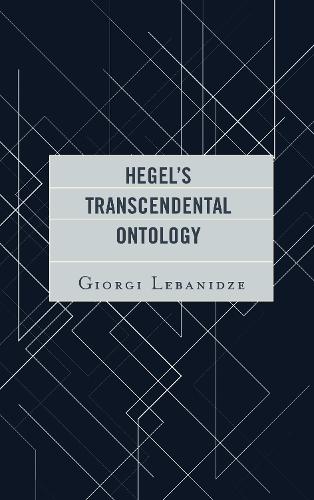
Hegel's Transcendental Ontology
(Hardback)
Publishing Details
Hegel's Transcendental Ontology
By (Author) Giorgi Lebanidze
Bloomsbury Publishing PLC
Lexington Books
14th December 2018
United States
Classifications
Professional and Scholarly
Non Fiction
Western philosophy from c 1800
193
Physical Properties
Hardback
182
Width 159mm, Height 237mm, Spine 19mm
413g
Description
Hegels Transcendental Ontologyargues that Hegel presents the kernel of his metaphysics, in the Doctrine of the Concept, the final part of hisScience of Logic. The Concept has three moments: universality (a process through which conceptual content of empirical determinations is formed), particularity (a holistic system of inferentially interrelated determinations comprising the totality of conceptual content), and individuality (the totality of objects conditioned by the shared system of empirical determinations that comprise the particular moment). The book details these three moments as well as the specific schema of their relation to one another. One of its aims is to offer a resolution to the recent debate between Kantian and traditional metaphysics-based readings of Hegel that has been dominating Hegel scholarship. The author claims that Hegel walked a narrow path between Scylla, of offering just another version of the traditional kind of metaphysics and Charybdis of abstaining from making any substantive claims about the nature of reality and focusing exclusively on the analysis of the faculty of understanding. Hegel left behind traditional approaches to the problems of metaphysics and, through a radical reformulation of the relationship between thought and being, proposed a new kind of metaphysics that is Kantian through and through.
Reviews
Much has been written in the last few years about the debate between epistemological and metaphysical interpretations of Hegel. That debate is too often framed by the assumption that the latter must view Hegels philosophical project as returning to some sort of pre-critical philosophical agenda. Lebanidze argues persuasively for an important corrective to that assumption, drawing both on a close reading of Hegels treatment of the Syllogism in the Science of Logic and a useful discussion of current work by Pippin, Brandom, McDowell, Horstmann, Bowman and Stern, among others. -- Allen Speight, Boston University
Author Bio
Giorgi Lebanidze teaches philosophy at Fordham University and Marist College.
